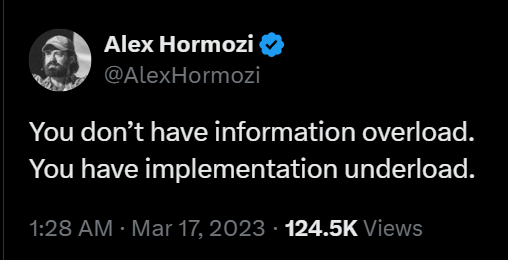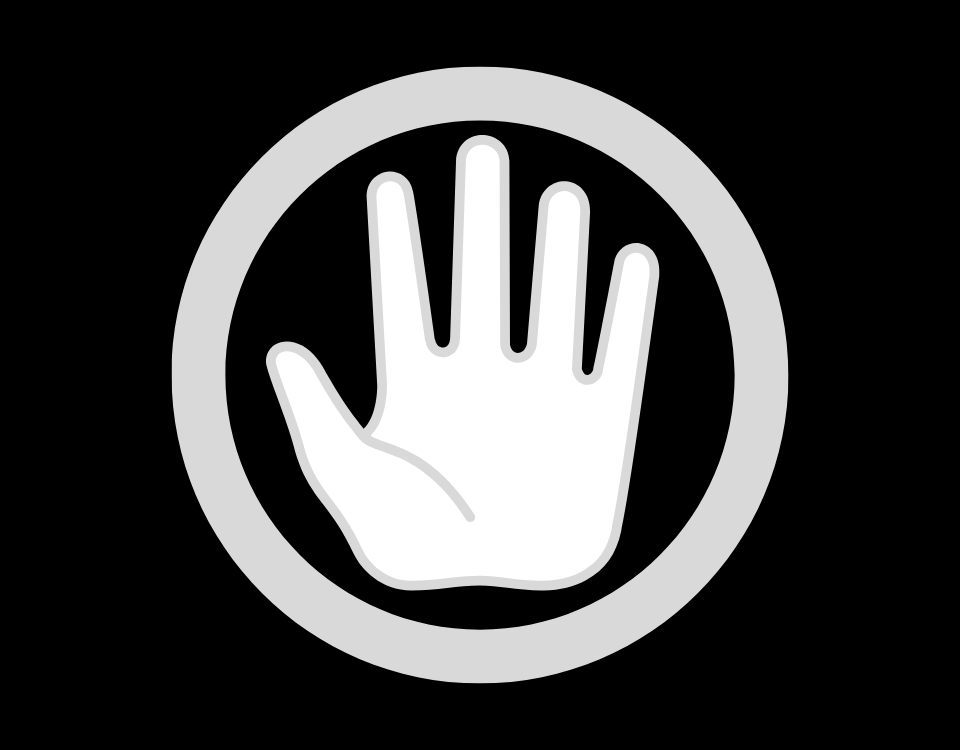Stop consuming too much content.
You’re watching too many YouTube videos and reading more articles than you need. If you keep this up, you’re hurting your progress instead of helping it.
How do I know all this? I've been there.
Let me make myself clear.
When I first ventured into the world of online business, I was plagued by one major issue—overconsuming content without doing anything with it.
Especially with the rise of YouTube where you can self-educate for free on almost any subject.
I found myself binge-watching YouTube videos on different topics, thinking I was being productive.
But when it came time to implement what I'd learned, I was always confused.
It felt similar to scrolling endlessly on social media without any specific focus.
It drained my productivity and I didn't make a single dime online until I learned the hard truth about ‘Information Overload.’
Thinking back, this wasn’t a new problem.
While in secondary school, some 40 years ago, I had friends who were so obsessed with consuming information that they'd unintentionally intimidate other students.
I vividly remember one boy in particular. He'd roam from student to student, asking random questions about various terminologies.
He used to do this especially during exam time - making others feel like they hadn't studied enough.
But here’s the kicker—the boy never went past the average grade. Despite overconsuming information, his performance never matched his efforts.
Along with others like him, he was a classic example of someone drowning in information overload.
He amassed more knowledge than he could process effectively.
It's More Serious Than You Think
Information overload has left many people worse off than when they had no information at all.
You’ll often see others making real progress, even though they consume far less information than you. They focus on action, not just learning.
I remember employing a lady many years ago. During a team meeting, we went around the room discussing everyone’s passions.
When it was her turn, she confidently said, “I just love browsing.” The room fell silent.
She wasn’t joking. This lady would come to work, burn through all the office data browsing the internet for hours with no clear purpose. She was, without a doubt, the most unproductive person I ever met.
She consumed information endlessly, but none of it translated into productivity, income, or any tangible benefit.
Knowledge is only powerful when it's applied.
Overcoming information overload isn’t just about cutting back on content consumption.
It’s about shifting from passive learning to active doing.

In the following sections, I’ll reveal the hidden consequences of overconsuming information and guide you on how to overcome this problem.
My aim is to transform your knowledge into productivity and wealth creation.
1. The Overthinking Syndrome
The first thing you’ll notice about people who overconsume information is that they suffer from paralysis by analysis.
This simply means they experience decision fatigue or an overthinking syndrome.
They find it incredibly hard to make decisions because they’re stuck in a cycle of overanalyzing every detail.
They feel the need to gather every bit of information before making a move.
Eventually, they reach a point where they can't make decisions at all.
Fear of making mistakes paralyzes them, leading to stagnation and inaction.
On the other hand, observe people who are constantly taking action and achieving results.
You’ll find they may not even know as much as you do.
They might not read as many books, watch countless YouTube videos, or consume endless content.
What sets them apart? They are quick at making decisions.
When you struggle with decision fatigue or overthinking, it’s often because you’re consuming more information than you need at any given time.
The Human Brain Cannot Process Too Much Information
Let me paint a picture to explain this better.
Say you want to offload a car filled with many items.
You can only remove items bit by bit.
For instance, if your hands are already full, you can't carry more items until you drop what you're holding.
Information overload works the same way.
The human brain is designed to handle small amounts of information at a time.
When you pile on more without processing the previous load, confusion sets in.
Your mind doesn't know where to start.
When you consume too much information from multiple sources (especially online), you reach a point where you don't even know who to follow or what advice to act on.
This leads to decision paralysis.
I’ve worked with many young entrepreneurs making millions online.
They have one thing in common. They make decisions fast.
They don’t wait around, overanalyzing every detail.

How to Overcome Decision Fatigue
i.) Set Clear and Achievable Goals:
When I started online, my goal was simple: learn how to design websites.
I was initially overwhelmed, jumping from one YouTube tutorial to another.
Everyone had different advice, and it was confusing.
The breakthrough came when I chose a specific goal and stuck with it.
It's similar to learning to drive.
You don’t need to master every car brand. You only learn with one car, and you can adapt to others easily.
Stick with One Mentor or Teacher:
Choose one person to guide you online. Don’t jump from mentor to mentor.
ii.) Apply the Pareto Principle (80/20 Rule):
Focus on the 20% of tasks that yield 80% of the results.
When consuming content, only 20% will actually help you make your first $1,000 online. Double down on that.
iii.) Embrace Imperfect Progress:
Start now. Don’t wait for the perfect moment. You learn more by doing and making mistakes than by over-preparing.
Imagine learning to drive a car. You won’t master it by reading manuals.
You get behind the wheel, make mistakes, and learn from them.
iv.) Leverage Information Advantage:
Find where you have a competitive edge.
There's something you know how to do better than an average person.
That's your information advantage according to Nicolas Cole.
Find out whatever it is and master it before moving to something new.
My own information advantage is that when I started pastoring, I wrote many books.
I took the challenge to learn graphics design and book formatting.
I've been responsible for designing and formatting my books and ministry materials for years.
I have used the same information advantage to help many others publish their books.
That skill alone has made me 6 figure back to back!
v.) Make Decisions Quickly:
Thought leaders and successful entrepreneurs don’t dwell on decisions for too long.
They assess the situation, make a choice, and adjust as needed.
vi.) Learn to Unstuck Yourself:
When you hit a roadblock, seek the information needed to move forward.
In a nutshell, don’t gather information for the sake of it.
Rather use knowledge to solve specific problems.
2. Scattered Attention
Information overload leads to scattered attention and goal confusion.
When you consume endless content from multiple sources, your attention becomes fragmented.
You find yourself jumping from one strategy to another without consistency.
And that dilutes your progress.
I remember when I first started online. Everywhere you turned, there were gurus flaunting Lamborghinis, promising to show you how they made their fortunes.
It took me a while to realize that most of these people just wanted me to buy their courses or follow them on YouTube.
Back then, there was no Instagram, TikTok or Threads.
We only had Facebook and YouTube. So I spent hours watching video after video.
And before I knew it, my entire day was gone, consumed by content.
I was confused about where to start from.
Should I adopt affiliate marketing? Or maybe dropshipping? No, perhaps Amazon Kindle publishing was the way.
I kept switching from one idea to the next, gathering more and more information but never taking action.
That’s what scattered attention does.
Eventually, you’ll find yourself stuck with a head full of knowledge but nothing to show for it.
The key to overcoming this is simple:
- Pick one path.
- Commit to one mentor.
- Choose one course.
- Stick with it and double down.
I remember when I went on Udemy to learn about copywriting. There were countless courses available.
Did I buy all of them? No.
I read the reviews, asked for recommendations, and picked one course. Then I ignored the rest.
It’s like learning to drive. You don’t need to practice with every car brand. You just need one car.
For instance, learn to drive a Toyota, and you can easily adapt to a Mitsubishi, Nissan, or any other car.
The principles are the same.
So, pick a mentor you resonate with. Learn from them. And apply what you’ve learned.
When I first started building websites, I tried several WordPress themes.
And it was overwhelming and confusing.
Some themes had poor support, and I’d be left waiting for a response to simple questions endlessly.
But everything changed when I discovered the Divi theme by Elegant Themes.
Divi theme's support was exceptional. And I learned about them through a mentor who guided me.
If I had tried to follow multiple mentors, I would have been overwhelmed with conflicting advice.
Structure Your Learning
Another way to avoid scattered attention is to structure your learning. Have a daily or weekly plan that separates learning from implementation.
For example, allocate one hour a day for learning. You can’t watch 50 tutorials in an hour, so you’ll naturally focus on one.
Take time to identify the content that resonates with you.
Ask experienced people for recommendations, then commit to that path.
Structure your time to balance learning and implementation.
Otherwise, you’ll spend all day consuming content without applying any of it.
It’s the same principle in other areas of life.
Think about people who spend their entire day in church from morning till night.
Attending every program without time to apply what they’ve learned.
Spiritual growth, like any growth, requires both learning and doing.
Follow the "Just-in-time" Learning Method.
Don’t try to learn everything at once. Focus on what’s relevant to your current stage. This is called just-in-time learning.
For example, I remember a guy during my university days.
He was fond of collecting notes from final-year classes even though he was still in his first year.
His argument was to prepare ahead for year five.
He hadn't even mastered his current first-year coursework, yet he was worrying about the future.
That’s information overload.
The best approach is to practice what you know.
When you get stuck, go back, learn what you need to unstuck yourself, then apply it.
This cycle of learn-apply-learn is the most effective way to manage information.
3. Mental Fatigue and Burnout
The next way information overload destroys productivity is through mental fatigue or burnout.
Some call it cognitive overload or brain drain.
When you constantly process new information, it wears you out.
Your brain gets overwhelmed, leaving little to no energy for creativity.
When you stuff yourself with too much information than you can process, it ends up blocking your ability to make decisions.
And what happens when you can't make decisions?
Your motivation is drained.
That’s when burnout sets in.
If you want to consume information effectively, be intentional about the type of information you allow in.
Let me give you a practical example.
Imagine someone learning to drive with 10 different cars.
They hop into a Toyota, get used to how the steering feels.
Then, they jump into a Mitsubishi, trying to figure out another steering style.
Next, a Mercedes-Benz.
How many cars can they possibly handle before they burn out?
This is what happens when you overload your brain with new information all at once.
Your brain isn’t built for that.
The brain thrives on focus.
The brain:
- latches onto one thing
- process it,
- adapts to it, and
- solves the problem
before moving on to something new.
I love teachers who break down lessons into small chunks, followed by practice sessions.
They don’t let you move forward until you’ve mastered the current lesson. That’s how real learning happens.
How to Overcome Mental Fatigue and Burnout
i. Limit Information Intake:
Set specific times for learning. Maybe 2 hours a day.
Don’t feel like you’re not learning enough.
Put what you've learned into practice before you consume more information.
Your brain is designed to process only the information you put to the test.
I remember buying an expensive course online sometime back.
Even though I spent a lot on it, I didn’t sit there all day trying to finish it.
I set aside one hour daily to study. That way, I had time for client work, personal projects, and even YouTube tutorials—one hour each.
When you structure your time in this manner, you limit the information your brain processes.
And this leaves room for creativity.
Your mind starts creating solutions with the information you already have.
ii. Work in Focused Intervals:
Use productivity techniques like the Pomodoro method.
Work for 25 minutes, then take a 5-minute break. Then repeat.
When I feel mental fatigue creeping in, I stop. I walk around the house, climb the stairs, grab a cup of coffee, or just stretch.
When I return to work, my mind feels refreshed.
The same information now makes more sense. My productivity shoots up.
iii. Prioritize Wellness:
Get enough rest. Exercise regularly. Practice mindfulness.
I don’t joke with my gym sessions. I go almost every day. The mental clarity it gives me is unmatched.
Exercise clears your mind, reduces stress, and boosts creativity.
I’m also mindful of what I eat.
Healthy food fuels my brain. It helps me offload unnecessary mental clutter and stay sharp.
4. Activity Trap
Information overload tricks you into thinking you’re being productive just because you’re busy.
But being busy doesn’t mean you’re achieving anything meaningful.
There’s a big difference between busyness and productivity.
In fact, many years ago, I had to sit myself down and differentiate between being busy and being productive.
I came to the conclusion that 'busyness isn’t business'.
You can be busy doing absolutely nothing that matters.
I know people who fill their days with endless tasks, but if you ask them, “What did you actually achieve today?” they stumble.
If you make plans with such people, they have you running from one place to another.
By the end of the day, you’re exhausted, without getting much done.
This is what I call the “busy work syndrome” or the “activity trap.”
You’re trapped in constant motion without any real progress.
Always Busy, Rarely Productive
Some people love the feeling of being busy.
Their phones are always ringing. One call ends, another begins.
They are the ones everybody goes to for advice, errands, and favors.
But here’s the thing: when you’re always available to everybody, it means you’re not focused.
People rarely get me on the phone instantly.
Why?
Because I’m busy with focused work.
If you call me and I pick up immediately, something is off in my routine.
Many confuse constant activity with productivity.
But if your goal is to make $1,000 in a week, being busy won’t get you there. Focused action will.
How to Break Free from the Activity Trap
i. Measure Real Progress
Track what you actually accomplish, not just the content you consume.
For example, if you plan to build a website, set a goal to complete one page today.
At the end of the day, check: Did you finish it?
Consuming endless tutorials without applying them won’t get you anywhere.
Clients don’t care how much you know. They care about the results you deliver.
ii. Use the 70-20-10 Rule
Dedicate:
- 70% of your time to implementation. Practice what you learn.
- 20% to reflection. Analyze what worked and what didn’t.
- 10% to learning. Just enough to gain new knowledge without overwhelming yourself.
Imagine learning to drive. Would you prefer sitting in the passenger seat while someone lectures for hours, or getting behind the wheel?
You learn by doing.
Get in the driver’s seat.
Make mistakes.
Ask questions when you’re stuck.
That’s real learning.
iii. The Learn-Apply Cycle
For every new piece of information, form the habit of taking immediate action.
Don’t save knowledge for “later.”
Because later never comes.
Information not applied quickly is often forgotten.
You don’t learn by cramming facts. You learn through struggle.
When you face a challenge, seek knowledge to solve it.
You cement the lesson you learn through the struggle you overcome.
For instance, if your goal is to build a landing page, don’t binge-watch tutorials.
Pick one good tutorial and double down on it.
Apply what you’ve learned, hit a roadblock, then find specific solutions.
Learn, apply, learn, apply.
That’s how to gain mastery in anything.
5. The Imposter Syndrome
One of the most damaging effects of information overload is that it leads to "imposter syndrome" or "success envy."
It breeds self-doubt and traps you in endless comparisons.
This is the case when you keep looking at what others are doing, and your own progress suddenly feels like nothing.
Why?
Because you’re consuming too much information without direction.
This isn’t just an online problem. It happens offline too.
I remember many years ago in the first church I pastored.
A lady stood up to talk during testimony time.
She spoke about visiting a massive church auditorium
It was then a newly constructed building - the size of three football stadiums combined.
Her best way of celebrating that achievement was through the imposter's syndrome.
She said, “When I saw what they’ve done, I felt useless about my life."
She continued, "I thought to myself, 'What am I even doing with my life?'"
I stood up right in the middle of her sentence to correct her.
Because that was self-doubt. A manifestation of the imposter syndrome.
She was drowning in someone else's success story.
Visiting someone else's magnificent projects without the right mindset can mess with your self-worth.
Why?
Because we misinterpret others' progress when we are not focused on our own.
This is the common trap online.
You stumble across so-called gurus flaunting their “$50 million success stories.”
Many of them are just trying to hook you with flashy numbers.
They prey on your insecurities and make you feel inadequate.
And once that feeling sets in, it paralyzes you.
You start doubting your abilities and think you’re not good enough.
Constant Exposure to other's Success Stories = Imposter Syndrome
When you keep seeing others’ success, especially when you’re just starting out, you feel like you’re not doing enough.
You compare your slow growth to someone else's highlight reel.
But here’s the truth: you’re comparing your 'Chapter 1' to someone else’s 'Chapter 20.'
It doesn’t make sense.
Imagine you just started learning how to drive.
Then you watch someone who’s been driving for 30 years.
Are you going to feel bad because you can’t handle the car like they do?
That’s madness.
But that’s what happens online every day.
People feel inadequate because they compare themselves to veterans.
How to Overcome the Imposter Syndrome.
You need to focus on your own journey. Set personal milestones. Your progress is not tied to someone else’s achievements.
If your goal this month is to build a landing page, focus on that. Master it. Celebrate that win.
I remember teaching my kids how to drive. I told them, “Don’t listen to road bullies.”
You know those drivers who honk aggressively, trying to intimidate new drivers? Ignore them. They don’t matter. Just focus on your lane.
It’s the same online. Ignore the noise. Focus on your growth.
1. Celebrate Every Win, No Matter How Small
When you achieve something, no matter how small, acknowledge it. Celebrate it.
If you learned how to set up an email campaign, that’s a milestone.
When I first learned how to manage hosting platforms and cPanel, it was a big deal. It took me time to figure it out. Now it’s second nature, but back then, it was an achievement.
I followed one mentor at a time. Shout out to Ferdy Korpershoek.
I’ve followed Ferdy for years, even before he got married.
Today, he has over a million subscribers on YouTube.
I stuck with his lessons, and that focus helped me grow.
2. Control Your Digital Environment
Limit exposure to content that triggers comparisons.
Surround yourself with growth-minded communities.
If someone’s content makes you feel inferior, unfollow them.
You don’t need that energy.
Even in real life, I don’t hang around people who brag or try to make others feel small.
It doesn't matter if it’s pastors or other people, I choose my circle wisely.
The same applies online. Curate your feed to support your growth.
If you do this, you’ll start seeing real progress.
Your first $100 online will come. Then $1,000. Then more.
And soon, you’ll be the one teaching others how to succeed.
That’s how to overcome information overload, my friend.
If you want to learn more about using the information you already have to make your first $1,000 online, click this link and read my next letter.
Bye for now.



